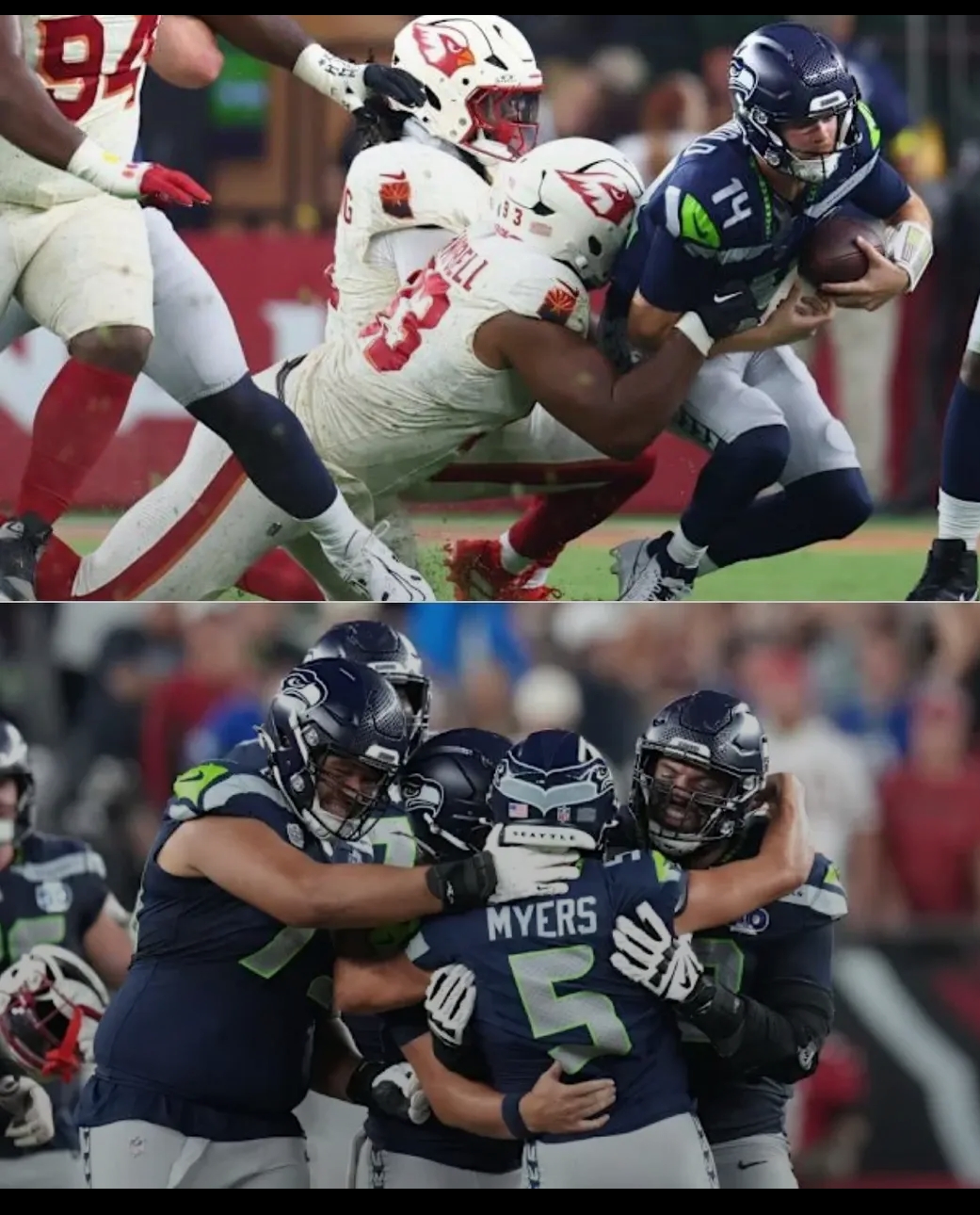CELEBRITY
Unbelievable Chaos in Arizona: Seahawks Shatter Franchise Record in Heart-Stopping Last-Second Victory Over Cardinals That Left Fans in Shock and Rivals Questioning What Just Happened on the Field

In the world of professional football, discipline is the invisible thread that holds a team together. It’s the silent force that separates championship contenders from talented teams that never quite reach their potential. For the Seattle Seahawks under coach Pete Carroll, a franchise known for its “Legion of Boom” defense and a swagger that bordered on audacious, the line between aggressive play and reckless indiscipline has often been a precarious one. This tightrope walk was never more apparent than during a period that saw the team not just flirt with but actively challenge the league’s records for penalties. It was a time when the yellow flag became as much a symbol of their identity as the hawk logo on their helmets.
The 2017 season, in particular, stands out as a monument to this struggle. Game after game, the Seahawks found themselves in a battle not just with their opponents, but with themselves. The constant barrage of penalties became a recurring nightmare, a self-inflicted wound that often proved more damaging than any defensive scheme or offensive onslaught they faced. While the team’s talent was undeniable, with stars like Russell Wilson, Richard Sherman, and Doug Baldwin, their inability to play clean, disciplined football was a constant source of frustration for fans and analysts alike.
One of the most glaring examples of this trend came in a game against the Washington Redskins, a contest that saw the Seahawks come perilously close to setting a new franchise record for penalties. With 16 flags for a staggering 138 yards, they were just one penalty shy of the team’s all-time high of 17. The penalties were not isolated incidents but a systemic breakdown across all facets of the game. False starts, holding calls, pass interference, and unsportsmanlike conduct penalties littered the field, each one a testament to a team that seemed to have lost its composure.
The offensive line, in particular, was a major source of these infractions. Germain Ifedi, the team’s right tackle, became a lightning rod for criticism, frequently flagged for false starts and holding penalties that stalled drives and put the offense in predictable passing situations. These mental errors were killers, turning manageable third-and-shorts into daunting third-and-longs. The frustration was palpable, not just in the stands, but on the sideline as well. Coach Pete Carroll, known for his energetic and optimistic demeanor, was visibly exasperated, his usual sideline prowling replaced with moments of stunned disbelief.
The defense, the vaunted “Legion of Boom” that had struck fear into the hearts of offenses for years, was not immune to this epidemic of indiscipline. Richard Sherman, one of the most intelligent and outspoken players in the league, found himself in the unfamiliar position of being a liability. In a memorable game against the Tennessee Titans that same season, Sherman was flagged three times on a single play – a trifecta of pass interference, holding, and unsportsmanlike conduct. The play was a microcosm of the Seahawks’ season: a moment of brilliance, in this case an interception by Kam Chancellor, wiped out by a stunning lack of discipline.
These weren’t just isolated incidents in a couple of games; they were part of a larger, more troubling pattern. For much of the 2017 season, the Seahawks led the league in penalties, a dubious honor for a team with Super Bowl aspirations. The sheer volume of flags was staggering, but it was the nature of the penalties that was most concerning. Many were pre-snap infractions, mental errors that spoke to a lack of focus and preparation. Others were post-whistle personal fouls, emotional outbursts that revealed a team struggling to control its temper.
So, what was the root cause of this penalty problem? Was it a byproduct of the team’s aggressive, “us-against-the-world” mentality? Was it a reflection of a coaching staff that had lost control of its players? Or was it simply the result of a talented but flawed roster that was beginning to show its cracks? The answer, as is often the case in professional sports, is likely a combination of all these factors.
The Seahawks, under Carroll, had always played with a chip on their shoulder. They were a team of late-round draft picks and overlooked free agents who had banded together to become one of the most dominant forces in the NFL. This underdog mentality fueled their success, but it also created a culture where pushing the limits was not just accepted but encouraged. The line between playing with an edge and playing recklessly was often blurred, and in 2017, it seemed as if the team had collectively crossed it.
The coaching staff, for its part, seemed unable to stem the tide. Carroll’s mantra of “Always Compete” had been the foundation of the team’s identity, but it appeared to be falling on deaf ears. Publicly, Carroll expressed his frustration and disappointment, vowing to clean up the team’s play. But week after week, the same mistakes were made, the same penalties were committed. It was a frustrating cycle of one step forward, two steps back, a dance of indiscipline that left everyone wondering if the team would ever get its act together.
The players, too, must shoulder their share of the blame. While the passion and intensity they brought to the field were often their greatest assets, their inability to channel those emotions in a productive way was their biggest downfall. The constant bickering with officials, the unnecessary roughness penalties, the taunting and trash-talking – it all pointed to a team that was more focused on winning individual battles than the war.
The consequences of this penalty problem were far-reaching. It not only cost them games but also created a sense of chaos and instability around the team. The once-feared “Legion of Boom” was beginning to look like a shadow of its former self, its reputation for dominance slowly being replaced by one of indiscipline. The offense, despite the heroics of Russell Wilson, was constantly being hamstrung by its own mistakes, unable to find a consistent rhythm.
In the end, the 2017 season served as a harsh lesson for the Seahawks. It was a stark reminder that talent alone is not enough to win in the NFL. Discipline, focus, and composure are just as important, if not more so. The yellow flag became a symbol of their undoing, a constant reminder of their failure to live up to their own high standards.
For the fans, it was a season of frustration and what-ifs. They had seen what this team was capable of, the heights it could reach when it was playing its best football. But they had also seen its dark side, the self-destructive tendencies that so often held it back. The memory of those penalty-filled games serves as a cautionary tale, a reminder that in the game of football, the most formidable opponent is often the one you see in the mirror. The legacy of that era is a complex one, a story of a team that was both brilliant and maddening, a team that could beat any opponent but could never quite conquer itself.












